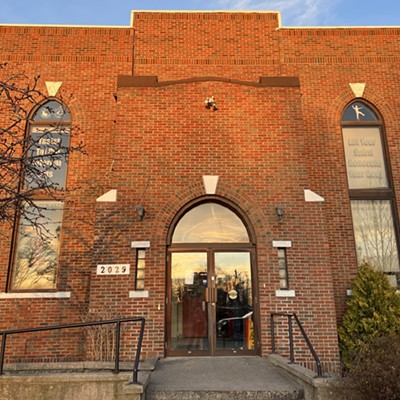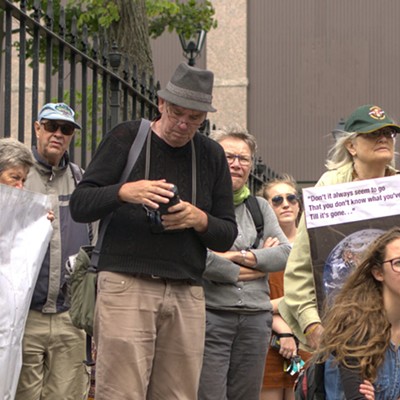Recounting the history of his involvement with the criminal justice system, Steve Deveau traces a line stretching nearly all the way across the country.
First, in Yarmouth, where his mother was a single parent and “there was a lot of addiction around the house, lots of different forms of abuse from people who were hanging around,” he says.
“With that comes the acting out.”
At eight, he got in trouble for smashing out streetlights. From there, offences started to pile up. Petty theft, DUIs, dangerous driving. A stint in detox led to a quiet period in Toronto, where Deveau got a job as a sheet metal worker, bought a house and a car and settled into a relationship.
“But I was so dysfunctional and disillusioned that all I could focus on was my self-destruction.”
He went west, but trouble followed him there too. “I ended up in jails and institutions across the country.”
Twelve years ago, Deveau served his last federal sentence. Yet even outside of prison, he wasn’t free. He struggled with alcoholism and the trauma of his abusive childhood. At 46, he took a trip to the
But as it turned out, some parts of his recovery would be even harder than he was anticipating.
“I was unemployable,” he says. “You’re in a recovery space where you’re trying to rebuild any kind of self-worth and when you can’t be self-supporting, it just keeps you in that old vicious circle.”
For the millions of Canadians who’ve been convicted of an offence, the box on an application form next to a question about their criminal record is more like a brick wall, separating them from volunteer positions, educational programs and employment.
According to groups like the Canadian Civil Liberties Association, more Canadian organizations have started to incorporate record checks into their hiring practices in recent years, diverting police resources and stymying the attempts of ex-offenders to reintegrate.
“It’s really the number-one issue” for ex-offenders, says Mark Knox, a criminal
This past week, prisoners at the Central Nova Correctional Facility published an open letter in protest of conditions inside the Burnside jail, listing 10 demands for change. Number two on the list was access to better rehabilitation programs, including those that teach employable skills.
But even with that training, the job market for ex-convicts is slim. Knox says the way criminal records affect people’s job prospects is profoundly counterproductive.
“You can’t just convict people and not allow them to work and think that they’re going to be good citizens,” he says. “And when people come out of prisons and don’t have support in a variety of ways including income, you might as well give them a ticket back.”
Yet advocacy groups and police departments say that record checks are an increasingly common part of the job hunt—and if you have a record, there are few protections from discrimination by potential employers.
Canada’s Human Rights Act only prohibits discrimination in cases where a record suspension has been ordered. Even then, only for federal employees.
And thanks to Harper-era changes to the criminal justice system, a record suspension is harder than ever to get. Under prime minister Stephen Harper, the application fee for a record suspension jumped from $50 to $631.
The waiting period before an application for a record suspension can be filed has also increased: from three to five years, after completion of a sentence for minor
As a description of the situation facing ex-offenders, though, “record suspension” is apt. If you have a criminal record, no matter how far you think your past is behind you, there’s always a chance it might come sneaking back.
When Deveau started weighing his options, the prospects were bleak. He knew he could get work doing manual labour, but an injury from his time as a sheet metal worker made those kinds of jobs untenable.“It’s the old saying, ‘You do the crime, you do the time.’ But that’s not it. The time never ends. You carry it around.”
tweet this
What he wanted most was a job where he could counsel people who were facing the same kinds of struggles that he’d wrestled with.
“That’s one thing that was lacking most of my life,” he says. Very few of the professionals he encountered in addictions and the criminal justice system had gone through what he had.
“They just had no idea of what that experience was like.”
But when Deveau tried to apply for a college program in social services, he says the admissions office at NSCC advised him he wouldn’t be able to complete the requirements. The practicum portion would require a criminal record check.
Universities and colleges in Halifax don’t require record checks from all students as compulsory part of the application process—unlike other jurisdictions such as in the US—but because a criminal record and vulnerable sector check (a more expansive record check that’s required to work with vulnerable people and children) are required for the clinical programs or practicum placements in some programs, a criminal record can make enrolling in certain college and university programs very difficult.
Pete Brown knows this all too well.
“I’ve always been a people person,” he says. “I’m constantly out there hustling, because that’s what I’m good at, and I’ve come to realize that there are a lot of skills that I had in my past life that are transferable.”
Brown’s past life includes roughly a dozen years spent in jails and prisons for armed robbery and other offences. For years, he also struggled with a serious drug addiction, which he’d picked up in his early
“I went from being a criminal and a gangster, we’ll say, to being a junkie and now I had to feed a habit. And the only skill set I had was criminal activity.”
Ten years ago—after nearly two decades of intermittent involvement with the criminal justice system—Brown was released from jail. He hasn’t been back since.
With his personal experiences and his facility for working with people, he decided he wanted to help others. It’s a common sentiment for people who’ve gotten clean after struggling with addiction, he says.
“The problem is, they start running into walls, and that’s what happened to me.”
He was honest about his past when applying for an addictions counselling program at Success College, and was told there was no sense in him doing the program because of his record. It’s why that “criminal record” box on applications is so damaging, he says.
“Because you don’t see the person, you don’t know who the person is.”
Despite the resistance, Brown persisted. He made some calls, compiled a list of several non-profits—like Direction 180, Mainline and the Salvation Army—that do hire people with criminal records. He then brought the list to the college as proof that someone with a record could find work in the field.
He says the admissions officer was impressed. No one else had ever gone that far. Still, it wasn’t enough.
For a while, he went back to construction. Eventually, Brown tried again. This time to the social services program at NSCC. A year and a half later, and after a struggle to convince Employment Nova Scotia to grant him funding through the Skills Development program—they cited concerns with his criminal record—Brown is about to enter his second year at community college.
His full-time studies are just one agenda item on a long list of volunteer engagements, peer mentorships and part-time jobs (he has two). Yet even with all this, he’s sure his record will come back to haunt him when it comes time to look for work.
“It’s not a matter of ‘if.’ I know it’s going to,” he says. “It’s the old saying, ‘You do the crime, you do the time.’ But that’s not it. The time never ends. You carry it around.”
Job-hunting can be a demoralizing process at the best of times. But in recent years the Canadian Civil Liberties Association has heard from so many Canadians for whom a criminal record has made finding a job all but impossible, that the CCLA has started investigating the use of record checks in the private sector.“It’s a pervasive problem. I think it’s getting worse.”
tweet this
“It’s a pervasive problem. I think it’s getting worse,” says Rob de Luca, a researcher with the CCLA.
De Luca points to a recent study by the John Howard Society of Ontario, which found that 60
For a rationale for these screening practices, look no further than the language used by the companies that run background check services and have a financial stake in the continued use of criminal record checks.
One of these companies, Triton, describes the process as determining a potential employee’s “moral character” in order to protect companies from “harassment, theft, assaults, drugs and fraud.”
The stigma against job applicants with a criminal record stems, at least in part, from the perception that they’ll re-offend. Employers don’t want to be targeted themselves, or risk being liable when a candidate they could have screened
“Once the conviction has relapsed for a few years, then the rate of possible
What research does show, however, is that steady employment significantly reduces the risk of recidivism.
There is no national legislation or even guidelines for what can be disclosed through the record check process, and the rules governing criminal records are a patchwork between provinces. British Columbia, Newfoundland & Labrador, Quebec, Prince Edward Island, Ontario and all three territories offer some level of protection in human rights legislation against discrimination based on a criminal record, according to the CCLA.
Yet, the ad hoc approach to what can be disclosed on record checks exposes people in some of these provinces to a counterintuitive workaround.
In Ontario, for instance, employers are prohibited from discriminating against those who’ve had a record suspension or those with records for provincial offences. But employers have been able to request a non-conviction record—which can include information about instances where someone was a person of interest in an investigation but never charged, or where charges were dropped—and discriminate on that basis. (This stands to change, though. Legislation that’s due to come into effect on November 1 will significantly limit the disclosure of non-conviction information.) British Columbia and Alberta also allow for the disclosure of non-conviction information through a police information check.
In Nova Scotia—one of the provinces that
Constable John MacLeod,
“It’s what considered to be accurate, rather than prejudicial.”
MacLeod says the department completes about a thousand checks a month.
“I think over the years it probably has increased, as certain industries have started to look at that and say, ‘Well, maybe that should be part of our due diligence before we hire someone.’”
Carbo Kwan, a Halifax lawyer whose services include assisting people who are applying for record suspensions, says while it may be reasonable due diligence for some employers to screen applicants who have records relevant to the job for which they’re applying, there’s nothing in Nova Scotia’s current legislation to stop an employer from taking a broader approach.
“Where it gets a little more tricky is over the years we’re seeing more employers asking for records,” she says. “It’s entry-level jobs, like working at Shoppers.”
Loblaws, which owns Shoppers Drug Mart, does ask for record checks as part of its hiring practices. Research suggests the practice is more often part of the hiring practices of large industries.
“That’s where it’s concerning,” says Kwan. “Employers shouldn’t be able to see that. It’s becoming a privacy issue.”
Of course, privacy isn’t being eroded through record checks alone. In an age of digital traceability, anyone whose crimes were publicly reported is just a Google search away from having their past interfere with their present.
After Julie (last name withheld by request) was released from the Nova Institution for Women in September, she started looking for work right away. She says she’d get some nibbles, but interest would often suddenly die out, as it did after one positive interview with an employer.
“I think she Googled me after she told me I was going to start Monday. I never heard back from her after [that].”
Julie used to work on the other side of the desk. She knows that employers screen candidates by doing basic background research long before they’re even at the point of having to ask for a criminal record.
But even so, she was surprised at how difficult it was to find work. The experience of sending out hundreds of resumes and receiving few responses—especially after the programs and preparation she’d done in prison—was demoralizing.
“I knew [the stigma] was out there, but I didn’t believe for one minute that somebody with my experience and my education and my job skills would have such a hard time finding even an entry-level position.”
There’s a bookshelf filled with binders in Julie’s
“Every single one of them is filled with courses and documentation and all kinds of shit that I got involved with at Nova,” she says. “Every bit of it was useless.”
While she was incarcerated, Julie says she got involved in everything from traffic control courses to peer mentorship training to knitting groups—partly to pass the time, but also to prepare for the day when she would be released and looking for work.
But all those skill development programs for inmates are ultimately useless, says Julie, without eduction for employers on the outside.
“All they see is, ‘You just came out of Nova, you’re trash,’” she says. “It takes a huge
Julie did eventually land work in Halifax—initially at a restaurant.
“It started off great,” she says. But within a couple of weeks, the atmosphere changed. “The employer made it perfectly clear to me that I was going to do what she
Working wasn’t a requirement of her parole, in fact, but it was important for her sense of self-worth. So she stuck it out as long as she could, often, she says, working extra hours without pay.
Her experience isn’t unique. She’s heard from other ex-offenders about employers who didn’t pay what the job advertised, or who expected the employee to work longer shifts. They all say the same thing: “Nobody else is going to hire you but me.”
Eventually, the stress was too great and she quit. After some searching, she landed a contract for 15 hours a week at a local non-profit. But she’s still looking for a full-time job. “And I’ll be looking for awhile.”
People like Deveau, Brown and Julie are some of the lucky
Of course, there are certain kinds of jobs that are easier for people with criminal records to get, such as restaurant work or construction—although a record can pose barriers even there, as Pete Brown found out in the days he was working construction. At one point, he was barred from joining the rest of his roofing crew on a job at a military base because of Department of National Defense policies on criminal records.
But a record is just one of the factors that can complicate the job hunt for people after they’ve been released from jail or prison. When you add in all the other challenges faced by those in Nova Scotia’s corrections system—including a lack of skills and education, mental illness, addiction and systemic bias towards people of colour—you have a system that erects barriers around people even after they’ve passed through the prison’s gates.
And criminal records don’t just affect employment. Applications for things from Canadian citizenship, to cross-border travel, to adopting a child are made complicated, if not outright impossible, by a record.
Knox says local governments have an important role to play in addressing the problem, by setting the tone for the private sector when it comes to hiring people with criminal records.
“I think it takes leadership, such as mayors and civic leaders, to encourage local government to hire people that have records.”
There are some changes afoot. Small steps, like a recent career fair at Central Nova Scotia, during which volunteers with criminal records were allowed to attend. The federal Liberals have also promised to revisit the Harper-era changes to the criminal justice system, including the record suspension process.
Whether any of these changes will be enough to counter the perception
As for Steve Deveau, he’s recently cobbled together a couple of part-time
Meanwhile, he still sends out applications for full-time positions. While his passion for the work hasn’t abated, the energy he has left to fight against the barriers posed by his criminal record is finite.
Addressing those barriers is complex, and will take coordination between multiple levels of government and the private sector. But for Deveau and others like him, the request is simple.
“All I want is to work,” he says. “Just to work.”































